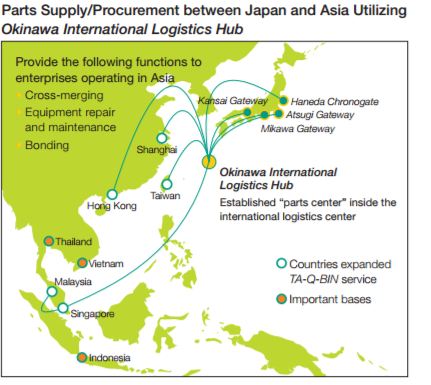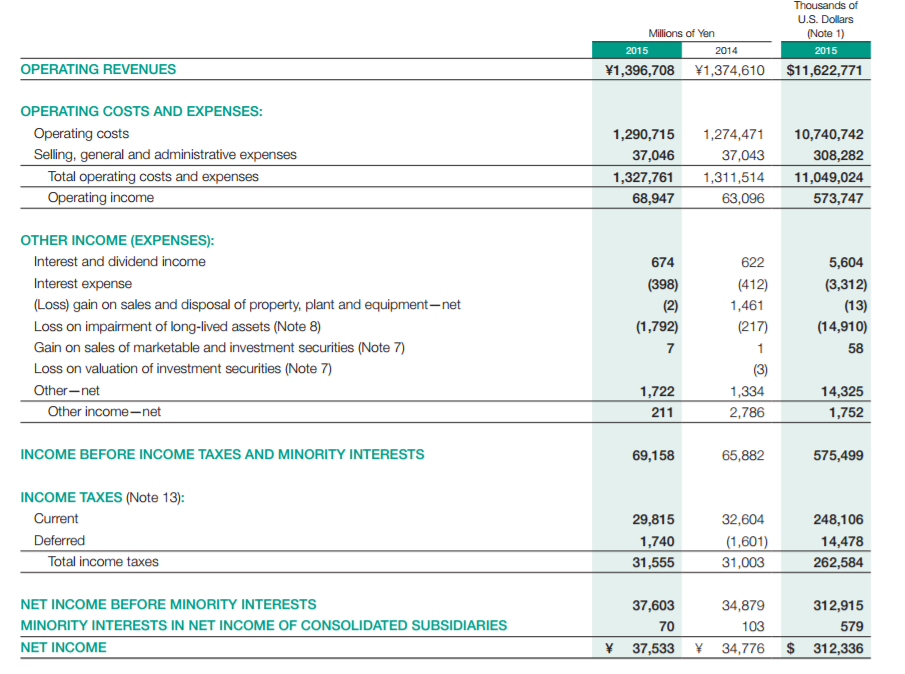Company Description
Company’s Name
The name of the company under description is Yamato Transport Co., Ltd. The other well-known name of the company is “kuroneko” that is translated as “black cat”; this name is based on the respective logo of the company (Yamato Holdings Co., Ltd., 2015).
Corporate Headquarters
The headquarters of Yamato Transport is located in Ginza, the most renowned district of the central part of Tokyo known as Chuo-ku.
Fleet Mix and Number of Airplanes, Ships, Tankers, Trucks in the Fleet
Unfortunately, the company does not provide the exact number of vehicles they use; however, it is known that the fleet of Yamato Transport is comprised of trucks and cars of different sizes that allow the company deliverers to reach any point in Japan. Moreover, since the country is situated on multiple islands, Yamato Transport has a fleet of boats to accomplish deliveries by sea (Miller, 2016).
Flight or Logistics Network
The Logistics network of Yamato Transport covers the entire territory of Japan, allowing the company to deliver to the customers located anywhere in the country. Moreover, the company operates internationally and has offices and networks in the countries of Europe, North America, and Asia.
Type of Service(s) Provided
Yamato Transport offers deliveries within Japan and international deliveries (receiving and sending); the company works with different types and sizes of cargos and parcels. Also, Yamato Transport offers express deliveries known as TA-Q-BIN services; such deliveries are completed within 24 hours (Bloomberg, 2016).
The Year of Establishment
Yamato Transport was founded in November of 1919.
Short History
The existing name of the company was established in 1929. In 1949 the company first became listed on the Tokyo Stock Exchange (Yamato Transport Co., Ltd., 2016). In the 50s, the company began to grow and conduct contracts with local airlines to implement deliveries by air. In 1957, the official logo of the company was created (a mother-cat carrying her kitten). In 1976, TA-Q-BIN was first established for the delivery of smaller parcels in one of the regions covered by the company (Yamato Transport Co., Ltd., 2016). In the 90s, TA-Q-BIN began to cover most of the islands of Japan; also, the company started its Welfare Foundation. At the beginning of the 2000s, Yamato started accepting credit cards and created an option of paying with credit cards after receiving the delivery. Further, Yamato expanded its TA-Q-BIN services to other countries such as Singapore and Malaysia.
Chief Executive Officer’s Name
Yutaka Nagao is the acting President of Yamato Transport.
Network Map
The map of the company’s network is presented below.

Alliances and Affiliated Partners
Some of the most renowned partners of Yamato are UPS helping the company accomplish its international deliveries, Uni-President Group in Taiwan – the convenience store chain, Shihlin Electric & Engineering Group (for the purpose of forming an e-commerce enterprise), some other Taiwanese courier services, and diverse strategic partnerships and acquisitions worldwide (Yamato Transport Co. Ltd., n.d.).
Posted Profit or Loss Last Fiscal Year
The consolidated income statement of Yamato Transport for the year 2015 is presented below.

Load Factor or Type of Load
The company does not report its load factor or type of load.
Total Cargo Flown or Shipped in Last Year
The company does not report its total cargo shipped in 2015.
Distribution Channels (Supply-Chain Channels)
Yamato’s supply chain is organized as 3rd Party Logistics or Contract Logistics; the company relies or a variety of warehousing and distribution locations, selecting them based on their gateway capacity, and the location close to the consumer markets (Yamato Transport Europe B. V., 2016). Yamato runs its Warehouse Management Systems in order to maximize the visibility of the deliveries and allow tracking the shipments.
Total Employees
As of March 2015, the company hired a total of 159,844 employees.
Other Information that Will Profile the Company
Throughout its history, Yamato Transport has been known for the support of eco-friendly practices of different kinds (Yamato Transport Co., Ltd., 2016).
SWOT Analysis
Strengths
The major strengths of Yamato Transport include its strong domestic market position and brand recognition. In the countries of Asia (such as Singapore, Malaysia, and Hong-Kong), Yamato Transport is the most reliable delivery service provider that is relied on by a large number of customers. In addition, the company has a well-organized logistics network in the region and is able to accomplish its well-known and extremely successful TA-Q-BIN deliveries that serve as a powerful source for the attraction of the new clients and the retention of the existing ones.
Weaknesses
TA-Q-BIN represents one of the major strengths of Yamato Transport and also is one of the weaknesses. The customers of this company rely heavily on this particular service. As a result, there is a need for the diversification of popular services and options, helping to eliminate the possibility of the customers’ turnover in case if TA-Q-BIN becomes unavailable. Another weakness is the low level of brand awareness worldwide and weak penetration of the international market. In that way, if the company decides to strengthen its international position, it would have to invest in the establishment of a series of new partnerships and the creation and maintenance of a sustainable supply chain.
Opportunities
The international expansion projects could strengthen the brand’s position in the global arena, making more customers aware of the company and thus providing it with a new source of profit. Another opportunity is the improvement of the quality of services provided through better operations management, staff training, and supply chain optimization. It is possible that the reorganization of the supply chain or its modification could improve the speed of deliveries and their quantity possible within a certain period of time. In addition, the company could add more services in order to ensure a higher level of diversification of services to address the varied needs of the consumers. Finally, the company could expand its range of partnerships and establish new alliances for the provision of logistics and warehousing services to businesses or start selling packaging materials.
Threats
The primary threat is presented by the prices for fuel that would produce a direct impact on the cost of the company’s services. The other threats are natural disasters complicating the delivery process (Japan is vulnerable to earthquakes) and the change in environmental regulations (the use of certain types of fuel, or emissions restrictions) influencing the number of vehicles available for the deliveries daily. Finally, one more potential threat is presented by the possibility of the emergence of a powerful competitor in case if some of the world-renowned competitors in the industry decide to expand to Japan.
References
Bloomberg. (2016). Company Overview of Yamato Transport Co., Ltd. Web.
Miller, K. K. (2016). 10 reasons why Kuroneko Yamato is probably the best delivery service in the world. Web.
Yamato Holdings Co., Ltd. (2015). Announcement regarding launches of TA-Q-BIN Compact and NEKOPOSU: Making small parcel delivery in Japan more convenient and reasonable. Web.
Yamato Transport Co., Ltd. (2016). Company overview. Web.
Yamato Transport Co. Ltd. (n.d.). Web.
Yamato Transport Europe B. V. (2016). Contract logistics. Web.